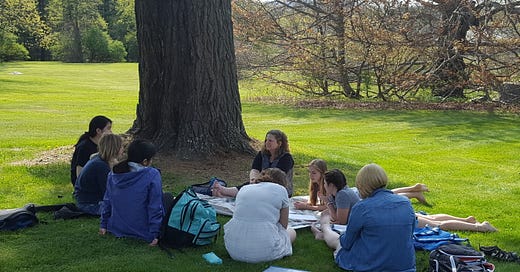Re-imagining Education in a Violent World
If the goal of education is making society better, it's essential for teachers to model the kind of social relations we value.
It's been a week since the marvelous online Ecoversities Alliance Re-imagining Education conference, and the conversation is still going strong on the conference WhatsApp channel, as the session videos are uploaded to You-Tube and plans are laid for a plethora of future explorations all over the world.
I loved the sessions I went to and would like to share with you some of what I learned from the talented, enthusiastic presenters. However, in the week since I "returned" to my own college campus, something else has come up that has my attention.
It's been one of those weeks. Is it accidental that trouble always seems to boil up around the Full Moon? Today's Full Moon is in Scorpio, opposite the Sun in Taurus, with an eclipse, to boot. Just a little intense, eh?
And sure enough, on campus this week the students staged a sit-in to protest the college's mishandling of sexual assault cases.
The eruption of the students' distress has punctured my delight at the disembodied online conference, forcefully reminding me that education cannot forget about or neglect the body.
In those teenage/young adult years, our bodies are bursting with hormonal energy and eager to explore with others. All well and good, as long as heartfelt sensitivity and respect is also developed, so that the explorations can be mutual, consensual and considerate. No one should ever be coerced, when it comes to body, mind or spirit.
The students are calling for better responses to a harm, once it has occurred. Yes and, I want to say, how can we work harder and better to make sure such harms do not occur in the first place?
I have the same feeling about abortion; yes, a woman has a right to manage her own reproductive health and can't we do better with teaching about and providing contraceptives?
With this in mind, I went back to Adrienne Maree Brown's work on Transformative Justice, a more ambitious alternative to the idea of Restorative Justice.
Restorative Justice works through communication to try to reconcile parties and restore the social fabric that was harmed. But what happens, Brown asks, if the pre-existing society was always and already harmful? What happens if the specific harm was enabled by the broader context of injustice?
For example, the majority of sexual assaults are committed by white men against women. This reflects the dominance of the straight white patriarchy. As long as we focus all our attention on punitive or restorative justice—punishing the assaulters and going back to business as usual—the context will remain in place and the harms will continue to occur.
So the deeper question that Brown raises so ably is: how can we transform society so that such violence becomes unthinkable?
How? Through education, of course. Education that seeks to reach students' minds, bodies and spirits; education that remembers that we are not disembodied talking heads, we are not flat-screen shadows; we are warm, soft, all-too-human animals, who live in community and must learn to respect each other's boundaries, to "play nice."
The American news is dominated by the constant repetition of harm and punishment (or, too often, lack of punishment). The criminal justice system tries to punish a "grab-'em by the pussy" ex-president, while at the top of the CJ pyramid sit frat boys and bullies who are themselves unworthy of respect. People are shot by their neighbors. Random bursts of rage leave corpses strewn on the ground. And that's just the local picture—that's not to mention the horrific wars going on relentlessly, and the ongoing horrendous assault on the more-than-human Earth community.
Against this grim backdrop, how do we educators, on the frontlines of our classrooms, try to instill values of respect and kindness in young folks?
More and more, I suspect that holding space for respectful discourse is my most important function as a teacher.
Yes, I can share what I know, what I've learned through my own studies and life experience. But if it were just about transmitting knowledge, a webinar would suffice.
If the goal of education is making society better, then what's essential for teachers is to show up with purpose and enthusiasm to engage young people wholeheartedly in the respectful exchange of stimulating ideas, modeling the kind of social relations we value.
At the Re-imagining Education conference, we educators played happily with each other online, enjoying a space where we could speak freely with peers about our frustrations, hopes and dreams.
Back in real life, the challenging reality of this time and place slaps me in the face like a wet towel. But I will not give up my dreams.
My favorite photo of me “holding space” for a class outdoors. Captured by Cathy Ingram.





Good morning, Jennifer. YES, I totally agree that it's essential for teachers to model the core values of kindness and respect for ALL sentient beings on planet Earth and also to love and care for Mother Earth, as our beloved Thomas Berry would say. And, as you say, this love and respect begins with "discourse." I would start this discourse with conversations and stories in pre-school and continue through adolescence with dialogue sessions and/or "Circles." If children have not learned this by then, the challenges of education become almost insurmountable. So teacher re-eduction then becomes an essential part of graduate programs. In my view, a curriculum that values a Holistic approach, or what Fritjof Capra calls "a systems view of Life, is a good way to start. I'd like to learn more about the conference you just attended! I do not use What's App. Is there another way to access the information? Thank you!
Love that you’re holding space in an outdoor classroom. No better place to do it.